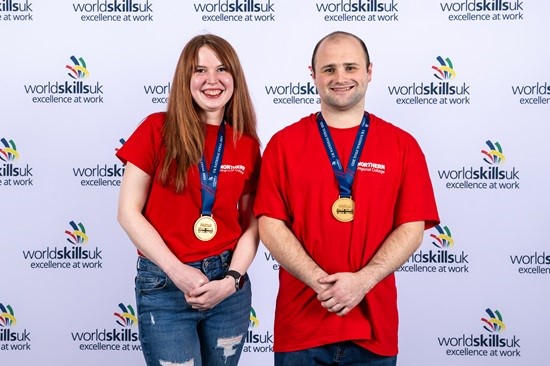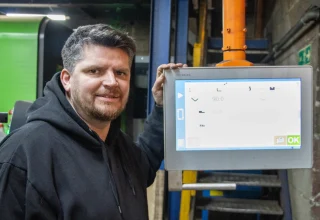
The winners of the 2023 WorldSkills UK Industrial Robotics competition, held in conjunction with FANUC UK, have been announced at an awards ceremony in Manchester. Representing the best of the UK’s rising robotics talent, Hannah Currie and Peter O’Neill from Northern Regional College in Northern Ireland beat over 50 talented young apprentices and students to take gold at the national finals, which were held over three days in November at FANUC’s UK headquarters in Coventry. The duo now have the chance to represent Team UK at the WorldSkills International Industrial Robotics competition in 2024.
The five teams that made it to the UK national finals were tasked with accurately programming a FANUC ER4-iA robot according to a brief set by the company’s technical team. This involved picking and placing parts and incorporated sensors and pneumatics components, as well as an extension task to create a digital twin. The teams were judged on a variety of skills such as accuracy of programming and equipment installation, as well as teamwork, safety, time management and documentation. The winning team triumphed with an incredible overall score of 97%.
The benefits to young people of taking part in the WorldSkills UK competition are myriad: from increasing their confidence, challenging their technical skill level and learning how to work as a team, to boosting their CV and helping them stand out when applying for future roles in the industry.
Winner Hannah Currie is currently in the second year of a Foundation Degree in Engineering and is pursuing a Higher Level Apprenticeship in Engineering with Wrightbus, where she is employed as a Manufacturing Technician. After receiving her award, Hannah commented: “It involved a lot of extra work, but it was well worth the effort as the skills we developed and the knowledge we picked up along the way will always stay with us and help us in our careers.”
Teammate Peter O’Neill trained as a welder with McAuley Engineering and completed a Foundation Degree in Engineering at Northern Regional College. He is now a second-year BEng Mechanical Engineering student with Ulster University and has encouraged other students to get involved in the WorldSkills UK competition: “You will learn new skills which could open future job opportunities. Participating in WorldSkills and qualifying for the national finals is something that will stand out on a CV.”
The finals were judged by a panel of experts from FANUC UK comprising competition organiser and Technical Manager, Paul Coombes; Technical Sales Support Engineer Dan Dunn; Fintan Collins, FANUC UK Academy Trainer; and former WorldSkills UK finalist Hara Konstantelia, now a FANUC Technical Sales Support Engineer. Hara commented: “Having seen both sides, I believe that the WorldSkills UK initiative is a great way of getting young people into robotics engineering by showing them what projects involve and what programming is. It teaches industry-level skills that are a really useful preparation for a career in automation.”
As a WorldSkills UK partner, FANUC is keen to inspire the next generation of robotics engineers and believes the programme is a great way to do this. “We want to engage with young people and enthuse them about robotics engineering as a career choice, so it was great to see so many talented entrants for this year’s contest,” said Paul Coombes. “The standard of the finalists was extremely high, and it was an honour to crown Hannah and Peter the winners with an outstanding score of 97%. The competition will soon be opening for entries for 2024, so if you know a young person who might like to give robotics a try, please encourage them to enter. There are no downsides to taking part!”
Ben Blackledge, Chief Executive, WorldSkills UK said: “This is a life-changing moment for these young engineers. They are the new generation of high flyers that will give UK employers a competitive edge. Our finals, in partnership with FANUC UK, not only celebrate the best in young talent, but also provide a vital opportunity to see how skill development in the UK stacks up both domestically and against our international neighbours. Skills will continue to be a key differentiator for business both at home and abroad and through our programmes we are working to ensure that all apprentices and students across the UK can gain access to high-quality technical education and apprenticeships that lead to real success for them and the UK as a whole.”
To find out more about the 2024 WorldSkills UK Industrial Robotics competition, including how to enter, go to: https://www.worldskillsuk.org/competitions/industrial-robotics/













